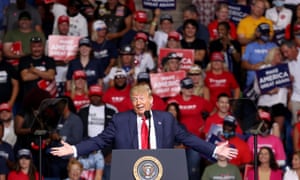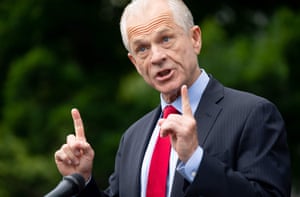Donald Trump
Concerns rise after White House attacked agency for reversing itself on an experimental drug treatment

Photograph: Win McNamee/Getty Images
Concerns that Donald Trump’s inner circle might pressure the Food and Drug Administration (FDA) to rush a coronavirus vaccine to market in time for the presidential election have risen after the White House attacked the agency for reversing itself on an experimental drug treatment.
Critics say that the FDA’s decision in April to approve hydroxychloroquine for emergency use – an approval that the agency revoked last Monday – demonstrated that the regulator is vulnerable to political pressure from the White House.
But other outside experts said that regulatory approval for any vaccine would require a degree of data transparency that would prevent the process from being unduly rushed.
The FDA’s reversal on hydroxychloroquine follows earlier missteps by the agency in confronting the pandemic, critics say, including an early blanket approval of ineffective antibody tests and a tight rein on private lab testing that lasted until 13 March.
“The worry here is that they will use the emergency use authorization standard” to approve a vaccine, said Ezekiel Emanuel, a medical professor at the University of Pennsylvania and former Obama White House health policy adviser.
“And if you give it to people and they think ‘Wow, I’ve got the vaccine now,’ they’re likely not to physically distance, wear face masks. And then if it doesn’t actually work, Oh! We’ve got a disaster on our hands.”
FDA commissioner Stephen M Hahn said the agency would not allow politics to enter in the search for a vaccine. “We take the development of a Covid-19 vaccine for the American people very seriously,” he said. “Science and data – not politics – has and will always guide our decision-making, including our work related to vaccines.”
Wayne Koff, president of the Human Vaccines Project, said he did not think “there’s going to be political pressure” to rush vaccine approval. “Because I think the data is going to be transparent, as all the data has been in this field,” Koff said.
But others fear that with the approach of the November election, regulators could come under unprecedented pressure to deliver winning headlines for Trump.
The US has tallied more than 2m Covid-19 cases and 119,000 deaths, almost tripling the death toll of the second-ranking country, Brazil. Both cases and deaths continue to climb in the United States.

Trump, who hosted a campaign-style rally in Oklahoma at the weekend, refuses to wear a mask in public and regularly contradicts health officials and mischaracterizes the scientific landscape. Last Tuesday, Trump credited scientists fighting coronavirus as “the best, the smartest, the most brilliant anywhere, and they’ve come up with the Aids vaccine.” There is no HIV vaccine.
Trump’s top trade adviser, Peter Navarro, has attacked the FDA in wild terms for its reversal on hydroxychloroquine, which the agency now says is “unlikely to be effective in treating Covid-19” and could have “potential serious side effects”.
“This is a Deep State blindside by bureaucrats who hate the administration they work for more than they’re concerned about saving American lives,” Navarro told the New York Times.
Trump claimed in May to have been taking the drug, which can have fatal cardiac side effects.
Other powerful pressures will be in play as the Trump administration strives to deliver “a few hundred million doses of vaccine by the end of 2020”, the marquee promise of the vaccine drive called Operation Warp Speed.
By elevating certain vaccine candidates, the Trump administration exercises immense power over which products may eventually be brought to market – and which companies cover their growing at-risk investments in research and production.
Five vaccine candidates were selected by the Trump administration earlier this month to receive millions of dollars in funding and priority status in upcoming trials involving tens of thousands of patients to test the candidates’ efficacy.
Operation Warp Speed, which is overseen by Jared Kushner, the president’s son-in-law, has issued no public standards or explanations for which vaccine candidates received priority and why.
“It’s been so chaotic, and it’s not even transparent to those of us who are trying to help out,” an unnamed source linked to Warp Speed told Science Magazine’s Jon Cohen of the candidate selection process.
The Department of Health and Human Services (HHS), which hosts Operation Warp Speed, said the selection process was “ongoing”.
“Vaccine candidates must meet a number of safety, efficacy and distribution standards to successfully advance through the OWS selection process,” a senior administration official said.
One of the leaders of the Warp Speed effort, Moncef Slaoui, a former pharmaceuticals executive, resigned in May from the board of the biotech company Moderna, which is developing a leading vaccine candidate. HHS announced that Slaoui would divest about $12.4m in Moderna stock options.
The Moderna candidate was one of the five finalists selected earlier this month by Warp Speed. The candidate has shown promising results in early clinical trials and is part of a key government partnership through the National Institute of Allergy and Infectious Diseases (NIAID).
An additional “stealth” vaccine candidate, which is being developed by the billionaire co-owner of the Los Angeles Lakers basketball team and does not appear on a list of candidates maintained by the World Health Organization, has separately been prioritized by the government for testing in monkeys, Cohen reported earlier this month. HHS did not reply to a request for comment on the selection.
Scott Gottlieb, a former FDA commissioner under Trump, questioned why the group of “finalist” vaccine candidates elevated by HHS did not include any traditional vaccine platforms, which use inactivated or attenuated virus to provoke an immune response. The vaccines advanced so far by HHS use novel genetics platforms.
“There’s no sort of old-style technology in this mix,” Gottlieb said on CNBC. “I’m surprised… because if you want to spread your bets, you probably want to spread your bets across different platforms. And they chose very novel platforms.”
Efficacy trials involve two groups, a vaccinated group and a control group, chosen from areas where the virus is actively spreading. If a vaccine is working, a statistically significant smaller number of people should get infected in the vaccine arm than in the control arm.
Dr Peter Gilbert of the University of Washington, a biostatistician who has pivoted from work on an HIV vaccine to help design and analyze Covid-19 efficacy trials, said that preliminary results from efficacy trials could land in October or November. These preliminary results would be submitted to a Data Safety Monitoring Board (DSMB) in Washington convened by NIAID, where they could quickly produce a licensure application.
“I would say that if everything goes well, if the enrollment is finding the cases – enrolling the right people that are actually at risk – and it starts on time, and the vaccine works, then I think it’s realistic that we could have the data go to the DSMB by the end of the year, that do show that a vaccine hits its success criteria. The first interim analysis, that could happen in November-ish or around there.”
The presidential election is on 3 November.
When the FDA revoked approval of hydroxychloroquine, Rick Bright, a former top government scientist who filed a whistleblower complaint this spring charging the Trump administration with ignoring Covid-19 dangers, called the action “long overdue”.
“The drugs should never have been brought into our country and should be destroyed,” Bright tweeted.
An FDA spokesperson said the agency would “thoroughly evaluate the data submitted in support of a vaccine’s safety and effectiveness, and will approve a vaccine for the prevention of Covid-19 only if the FDA determines that it is safe and effective for its intended use.”
But concerns persisted that the agency had caved on hydroxychloroquine and might do so again on vaccines. In the event the FDA appeared to be doing so, scientists might have a limited ability to raise the alarm, said Emanuel.
“This administration – they have objectives that aren’t necessarily adhering to what scientists like me say, right?” Emanuel said. “I mean that’s the problem here.”




